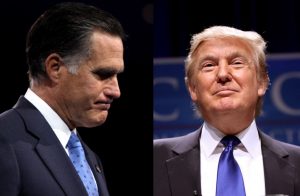
Mitt Romney may be vehemently opposed to Donald Trump. But Trump could not have won the nomination without him.
At least, that is the case put forward by Gwynn Guilford in a recent article from Quartz. Guilford details how rule changes implemented by the GOP elite in 2012 election ended up backfiring, and to the elite’s dismay, propelled the unconventional, anti-establishment wild-card Trump to the Republican nomination.
The article identifies three dramatic rule changes, which, though aimed at ensuring party unity around an establishment candidate, instead helped pave the way for Trump’s resounding victory:
1.) The first rule “forced states to bind their delegates to the popular vote results, rendering moot the caucus system of electing delegates to vote their conscience.” While the rule was originally intended to prevent a Ron Paul-type insurgency during state conventions, Trump was able to take advantage of this change in the 2016 primary, where, for example, he scooped up 8 Minnesota delegates without ever stepping foot in the state. If the delegates were unbound, he would likely have received far fewer, but by using his celebrity status and ability to generate free media, he was able to quickly and effectively get his name out in the state — all without having to persuade seasoned Republican delegates to back him.
2.) The second rule change (Rule 12), let “the RNC amend the rules in between national conventions” which is why, in January 2014, it was allowed to shorten the primary schedule for certain states. This “[magnified] the advantages of candidates with more resources and national media reach. A big travel budget—or, for that matter, a private jet—allows richer candidates to compete for the popular vote in a dozen states at once, while stretching grassroots competitors thin.” Any guesses as to which candidate benefited most from this rule?
3.) Finally, Rule 40 was implemented with anticipation of a Romney 2016 re-election. This revision stated that “only candidates with a majority of delegates in eight states could appear on the national convention ballot.” While this certainly would have helped keep outsiders candidates off the stage and paved the way for President Romney to be renominated “in a show of party unity,” the GOP establishment were way ahead of themselves. Instead they watched helplessly as their revision forced rival candidates out of the race early, further securing Trump’s position at the head of the pack.
With all these changes more or less established, Guilford suggests that Trump-style campaigning, rather than the traditional strategy focusing on grassroots activists and local and state party leaders, “now seems to be the way of the future.” So were the changes a mistake? Some in the article ardently defend the caucus system due to the higher quality campaigning it encourages, while others believe that this new direction “allows more average people access to the process.”
Winston Churchill once said “to improve is to change.” The GOP will soon find out if he was right.
Chris Stach works for the American Principles Project.


